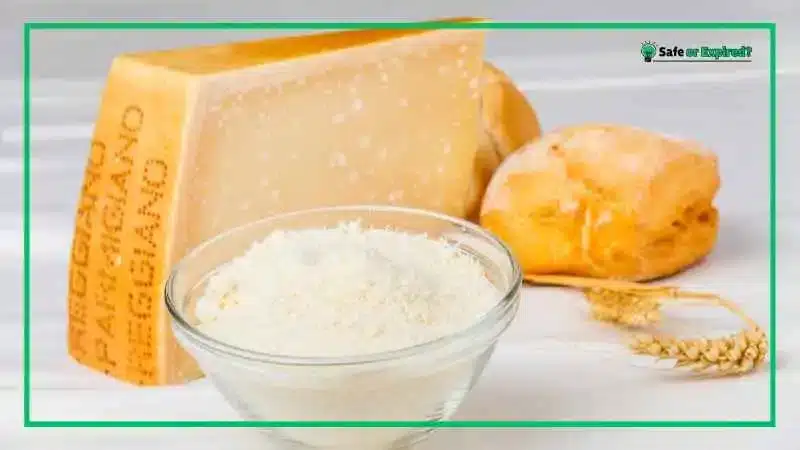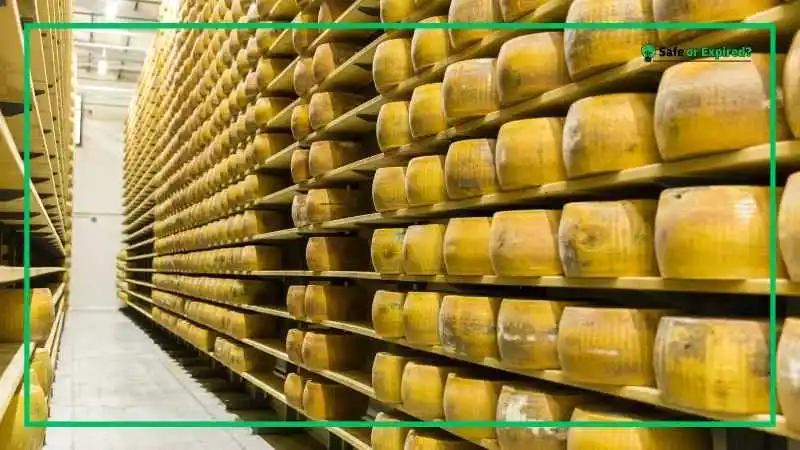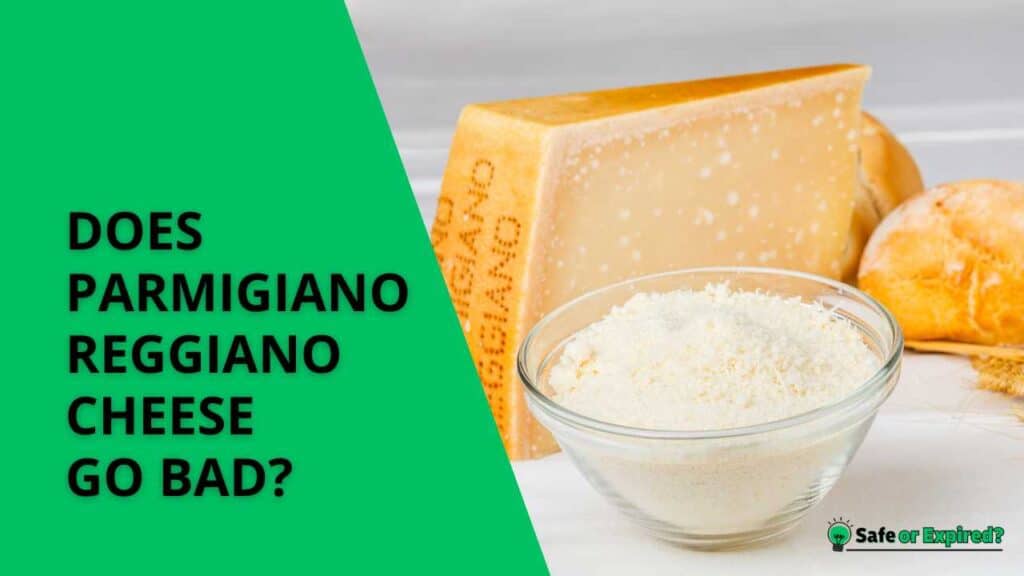“Does Parmigiano Reggiano cheese go bad?” is a usual topic among chefs. Yes, this cheese can go bad, but it has a long shelf life. But before you use it, you should learn how to spot bad cheese and the best ways to keep it fresh.
Stick around and find out the best tips to keep Parmigiano Reggiano tasty and safe!
Does Parmigiano Reggiano Cheese Go Bad?
Yes, Parmigiano Reggiano cheese can go bad, but it has a long shelf life compared to many other cheeses. Over time, it can develop mold, become dry, or lose its distinctive flavor. To keep it fresh, keep it wrapped in wax paper or parchment paper.
Many people ask, “Does parmesan cheese go bad if left out?” Parmesan cheese, including Parmigiano Reggiano, can go bad if left out at room temperature for too long. Ideally, it should not be left out for more than two hours.
Beyond this time, the cheese may start to dry out, and its quality will deteriorate. Bacteria can also grow on the cheese, especially in warm environments, leading to spoilage. If you accidentally leave it out overnight, inspect it carefully before using it.
You may be wondering, “Does parmigiano reggiano cheese need to be refrigerated?” Yes, Parmigiano Reggiano cheese should be refrigerated to keep it fresh and prevent spoilage. I suggest storing it in the cheese drawer or a designated area in the fridge where the temperature is consistent.
But does parmigiano reggiano cheese go bad in the fridge as well? Unfortunately, yes. Parmigiano Reggiano cheese can still go bad in the fridge if not stored properly. While refrigeration extends its shelf life, improper storage can lead to spoilage.
How Long Does Parmigiano Reggiano Last?
Parmigiano Reggiano cheese has a long shelf life due to its low moisture content. Unopened, it can last up to a year in the fridge. After opening, it should be consumed within a few months for the best flavor.
Overall, proper storage techniques, such as wrapping in wax paper and using airtight containers, can significantly extend the cheese’s usability.
So, how long does Parmigiano Reggiano last after opening? After opening, Parmigiano Reggiano cheese can last up to 6 months, depending on where you store it. Many people have sent this query, “How long does Parmigiano Reggiano last in the fridge?” Parmigiano Reggiano cheese can last up to a year in the refrigerator if it is unopened and stored correctly. Once opened, it can last up to 6 months.
Wondering, “How long does Parmigiano Reggiano last in the freezer?” In the freezer, Parmigiano Reggiano cheese can last up to a year without significant loss of quality.
All in all, remember this Parmigiano Reggiano’s shelf life table.
| Opened | Un-Opened | |
| Counter | Not recommended | Not recommended |
| Fridge | Up to 6 months | Up to 1 year |
| Freezer | Up to 1 year | Up to 1 year |
Does Parmigiano Reggiano Go Bad After the Expiration Date?
Parmigiano Reggiano cheese can still be safe to eat after the expiration date if stored properly, but its quality may decline. The expiration date is typically a guideline for peak freshness. Inspect the cheese for signs of spoilage, such as mold or a change in texture.
If none are present, it is likely still safe to consume. However, it’s best to use your judgment and prioritize freshness for the best flavor and texture.
Does Grated Parmesan Cheese Go Bad?

Yes, grated Parmesan cheese can go bad. It has a shorter shelf life compared to whole Parmesan cheese due to its larger surface area. Grated Parmesan is more prone to absorbing moisture and odors, which can lead to spoilage.
Proper storage is essential: keep it in an airtight container in the refrigerator. Remember that consuming spoiled grated Parmesan can pose health risks, so always check its condition before use.
Here, I want to discuss this query, “Does Grated Parmesan cheese go bad if not refrigerated?” Grated Parmesan cheese can go bad quickly if not refrigerated. At room temperature, it is susceptible to bacterial growth and spoilage, especially in warm or humid conditions. It can develop mold, an off smell, or a clumpy texture.
For safety and to maintain quality, always store grated Parmesan cheese in the refrigerator. If left out for more than two hours, it’s best to discard it to avoid foodborne illness. Interesting, right?
Are you a fan of Velveeta cheese, too? Here, I want to recommend another guide – Does Velveeta Cheese Go Bad? Tips + Answering Your FAQs.
How To Tell if Parmigiano Reggiano Is Bad? Key Signs
To tell if Parmigiano Reggiano is bad, check for changes in its texture and smell. Normally, it’s hard and crumbly with a rich, nutty scent. If it smells off or feels unusually soft or damp, it might not be good to use anymore.
Mold
Mold is a big red flag when it comes to cheese. If you see any green, blue, or black spots on your Parmigiano Reggiano, it’s probably gone bad. Mold can spread quickly, so even if it’s just a small patch, it’s best to toss the whole piece.
This kind of mold isn’t the same as the good mold used in blue cheese. It can make you sick, so be careful.
Sour Smell
Your nose knows best! If your Parmigiano Reggiano smells sour or off, it’s time to throw it away. Fresh Parmigiano has a nutty, slightly sweet smell. When it starts to go bad, it loses that nice aroma and can smell sour or even rancid. Always trust your sense of smell. If it doesn’t smell right, don’t eat it.
Dry and Crumbly Texture
Parmigiano Reggiano is supposed to be hard, but it shouldn’t be dry or crumbly. If your cheese is falling apart or feels dry to the touch, it might be spoiled. Fresh Parmigiano should be firm and have a slight give when you press it. When it’s bad, it can also feel gritty. This change in texture means it’s past its prime.
Dark Spots
Dark spots on your cheese are a no-go. They can be a sign of mold or bacterial growth. If you see any dark or discolored areas, it’s best to get rid of the cheese. These spots can make you sick if you eat them. Always inspect your cheese closely before eating. Here’s what Parmigiano Reggiano should look like:

Off Taste
If your Parmigiano Reggiano tastes funny, don’t eat it. Take a small bite and pay attention to the flavor. Fresh Parmigiano has a rich, nutty, and slightly salty taste. If it tastes sour, bitter, or just off, it’s probably spoiled. Don’t risk it. If the taste isn’t right, it’s better to be safe and throw it away.
Is It Ok To Use Expired Parmigiano Reggiano Cheese?
Using expired Parmigiano Reggiano cheese can be okay if it still looks, smells, and tastes good. Check for signs of spoilage like mold, sour smell, or off taste. If it passes these checks, it should be safe to use. However, for the best flavor and safety, it’s usually better to stick to the expiration date.
Check for Mold
Always check for mold first. Mold on cheese can be dangerous, especially if it’s green, blue, or black. Even a small spot can mean the whole cheese is bad. If you see any mold, don’t take a chance. Throw it away. Mold can make you sick, so it’s better to be safe.
Smell Test
Your nose is a great tool for checking cheese. Fresh Parmigiano Reggiano smells nutty and sweet. If it smells sour or rancid, it’s probably gone bad. Don’t eat cheese that smells off. Trust your senses. A bad smell is a clear sign that the cheese isn’t good anymore.
Taste a Small Piece
If the cheese looks and smells okay, taste a small piece. Fresh Parmigiano should taste rich and nutty. If it tastes sour, bitter, or just weird, it’s not good anymore. Don’t eat it. Tasting a tiny bit won’t hurt you, but if it’s bad, don’t eat more.
Look at the Texture
Parmigiano Reggiano should be firm and slightly crumbly. If it’s too dry, crumbly, or gritty, it might be spoiled. Check the texture before using it. If it doesn’t feel right, it’s better to throw it away.
Expiration Date as a Guideline
The expiration date is there to help you know when the cheese is at its best. It’s usually safe to eat a little after this date if it still looks, smells, and tastes fine. But remember, the longer it’s past the date, the higher the chance it’s spoiled. Always check carefully.
Best Practices to Extend the Life of Parmigiano Reggiano Cheese?
To extend the life of Parmigiano Reggiano cheese, store it in the fridge. You should also wrap it properly in wax or parchment paper, use airtight containers, and avoid moisture. Plus, keep it away from strong odors, freeze it if necessary, use a dedicated cheese drawer, and check it regularly for spoilage.
Store It in the Fridge
Always keep your Parmigiano Reggiano cheese in the fridge. The cold temperature slows down pathogens, like bacteria and mold, which keeps the cheese fresh for a longer time. Find a spot in your fridge where the temperature stays consistent.
I usually put mine in the cheese drawer or on a middle shelf. This simple step helps your cheese last longer and taste better.
Wrap It Properly
Proper wrapping is key. Wrap your Parmigiano Reggiano in wax or parchment paper first. Then, you should cover it with plastic wrap, as the double layer keeps the cheese from drying out.
I’ve found that this method keeps my cheese fresh for weeks. Make sure to change the wrapping every few days to keep it clean and effective.
Use Airtight Containers
Put your wrapped cheese in an airtight container. This adds an extra layer of protection. An airtight container keeps the cheese from getting too much air, which can dry it out. It also prevents other fridge smells from getting into your cheese.
I like to use a small glass or plastic container with a tight-fitting lid. This keeps my cheese fresh and tasty.
Avoid Moisture
Keep your cheese away from moisture. Moisture can make cheese moldy and spoil faster. After using your cheese, make sure it’s dry before wrapping it up again. If you notice any moisture inside the container, wipe it out with a paper towel.
Moreover, if you store Parmigiano Reggiano in a cool spot, you won’t have to deal with any moisture problem. Here’s an example:

I always check my cheese for any wet spots before storing it. This helps keep it in the best condition.
Keep It Away from Strong Odors
Parmigiano Reggiano cheese can absorb strong odors from other foods in your fridge. To avoid this, store it away from foods like onions, garlic, and fish. Using an airtight container helps, but also, be mindful of where you place the cheese in your fridge.
I try to keep my cheese in a designated spot, away from anything with a strong smell. This keeps its flavor pure and delicious.
Freeze If Necessary
If you don’t use your Parmigiano Reggiano soon, consider freezing it. I’ve found that freezing can change the texture slightly, making it more crumbly, but the taste stays great. It’s a handy way to keep cheese longer.
Use a Dedicated Cheese Drawer
If your fridge has a cheese drawer, use it. A dedicated cheese drawer maintains a consistent temperature and humidity level that’s ideal for storing cheese.
I always use my cheese drawer for storing all my cheeses. It helps keep them fresh and prevents them from drying out or getting too cold. If you don’t have a cheese drawer, try to find a spot in your fridge that isn’t too cold and stays dry.
Check Regularly for Spoilage
Regularly check your cheese for any signs of spoilage. Look for mold, a sour smell, or changes in texture. I make it a habit to inspect my cheese every time I use it. If you notice anything off, it’s best to throw it away.
Keeping an eye on your cheese helps ensure you’re always eating it at its best. This habit has saved me from eating spoiled cheese many times.
Conclusion
To sum up, Parmigiano Reggiano cheese can go bad. Here’s a quick look at the shelf life:
- Counter: Not recommended.
- Fridge (Unopened): Up to 1 year.
- Fridge (Opened): Up to 6 months.
- Freezer: Up to 1 year, but the texture may change.
By knowing these details, you can enjoy your Parmigiano Reggiano cheese at its best for longer!

